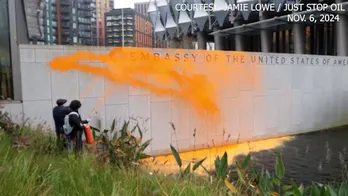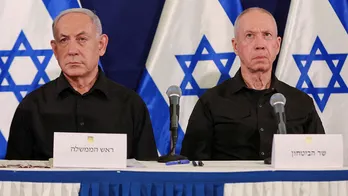Strikes along Israel's border with Lebanon are again fueling fears of a widening war
TEL AVIV, Israel - For months, there have been concerns over the conflict between Israel and Hamas spilling over into a widespread regional war.
A series of deadly strikes on Wednesday and Thursday served as a warning that the daily cross-border skirmishes between Israel and forces in Lebanon could quickly escalate.
Tensions began to ratchet up on Wednesday morning, when a barrage of rockets fired from Lebanon struck three towns in northern Israel, less than 10 miles from the border between the two countries. One Israeli soldier was killed and at least eight others were wounded, according army and medical officials.
Hezbollah, the Iranian-backed Lebanese militia, has not claimed responsibility for the attacks, but says it has been firing rockets at Israeli positions near the border as part of its deterrence strategy toward Israel and in solidarity with Hamas.
By Wednesday afternoon, the Israeli military confirmed that it had struck targets in at least five towns in southern Lebanon, killing at least 13 people.
According to Lebanese state media, the dead included three Hezbollah fighters and 10 civilians. A Syrian woman and her two sons, ages 2 and 13, were among the civilians killed.
Israel launched further strikes on Thursday.
Tough talk on both sides
Analysts say that Israel and Hezbollah would both like to avoid all-out battle, but the past two days of attacks have led to an escalating war of words between officials on both sides.
In a statement to Reuters, Hassan Fadlallah, a Lebanese lawmaker and senior Hezbollah official, said that Israel "will pay for the price of these crimes."
In a meeting with military reserve commanders on Wednesday, Staff Lt. Gen. Herzi Halevi of the Israel Defense Forces (IDF), emphasized his country's plan to prepare for a war on its northern front.
"This is our first task and no one disagrees with us, and we are now focusing on being prepared for war in the north," said Halevi, in comments shared with the press.
"In the end, we will be ready for a war. It if doesn't end in war, won't end in a compromise," he added, referring to pushing back against Hezbollah.
There's a lot of history at this border, where there has been off and on conflict in some measure since 1982, when Israel invaded Lebanon in an effort to dismantle the Palestinian Liberation Organization inside the country. By 1985, Hezbollah started fighting Israel for border territory in a conflict that lasted 15 years. In 2006, another war erupted with the killing and abduction of Israeli soldiers by Hezbollah.
There remains disputed territory at the border — roughly 330 square miles of land that hold natural gas resources. Israel wants Hezbollah to pull its forces away from the border, as agreed upon after the 2006 war.
Despite the rhetoric, Imad Salamey, a senior Middle East policy advisor and associate professor of political science and international affairs at Lebanese American University in Beirut, told NPR that Hezbollah is not seeking to expand the conflict.
Salamey described the current fighting as part of "Hezbollah's game of tit-for-tat with Israeli troops on the border," and as with other Iranian proxies, it is "involved in various approaches to distract Israeli troops" from the conflict in Gaza. But Hezbollah "is not trying to invite a massive retaliation," Salamey said.
A war in Lebanon would also not serve Israel's best interest, according to Salamey, because it risks undermining efforts to secure northern Israeli towns, which means people are unlikely to want to move back. In his statement on Wednesday, the IDF's Halevi emphasized the importance of returning displaced Israelis back to their homes in the north, referring to those who evacuated towns near the border with Lebanon after the Oct. 7 Hamas attack on Israel that killed 1,200 people.
Still, Salamey said there's reason to be concerned.
"A spillover or things getting out of hand may lead to a much wider scale type of war and that's very concerning," he said.
Sarah-Masha Fainberg, a senior defense expert at Tel Aviv University, said the possibility of a war is becoming increasingly real.
"The equation of deterrence is eroding and the attacks have increased significantly in scope and intensity," she said, adding that Israel appears to be preparing for a war with Hezbollah in the spring or the summer, with regular drills to prepare both troops and residents near the border.
"There could be a war with Hezbollah tonight," she said, but how things would develop is hard to tell.
"The fog of war, or miscalculation," she said, "It's not clear to the Israeli public what would be a red line on when [the Israeli military] can strike against Hezbollah — would it be if they strike Haifa? If they killed 100 people?"
Israel, she said, is dealing with an emboldened Hezbollah, and what appears to be a marked increase in Iran's capabilities. She dismissed the argument that this week's strikes from Lebanon are posturing or that Hezbollah doesn't want to get into a war.
That was the thinking with Hamas, she said. But, she continued, the "Israeli strategy that Hamas is deterred to attack Israel based on the price it would pay" was proven wrong by the events of Oct. 7, said Fainberg.
"We might have to rethink all the paradigms."
Cease-fire negotiations
The latest round of strikes risk further complicating efforts to secure a cease-fire between Israel and Hamas, with Israeli media reporting that Prime Minister Benjamin Netanyahu will not be sending a delegation to Egypt on Thursday to continue talks that began earlier this week.
And those talks could carry implications for Israel's northern border with Lebanon.
Hezbollah's leader, Hassan Nasrallah, has said that any agreement on the shared border with Israel could only be reached in the event of an agreement between Israel and Hamas to pause the fighting in Gaza that to date, has killed more than 28,500 Palestinians, according to the Gaza Health Ministry. The war has also inflamed long-simmering tensions between Israel and a number of Iranian-backed militias in Iraq, Yemen, Syria and Lebanon.
Meanwhile, roughly 1.4 million Palestinians in the town of Rafah, in southern Gaza, are awaiting possible evacuation orders from the Israeli military, which carried out an operation there on Monday to rescue two hostages. Health officials in Gaza say the Israeli raid resulted in the deaths of 74 people.
The last cease-fire between Israel and Hamas was in November, and lasted seven days. During that time, Hamas released 50 of the hostages it abducted on Oct. 7, and Israel, in turn released 150 Palestinian prisoners.
Disclaimer: The copyright of this article belongs to the original author. Reposting this article is solely for the purpose of information dissemination and does not constitute any investment advice. If there is any infringement, please contact us immediately. We will make corrections or deletions as necessary. Thank you.







